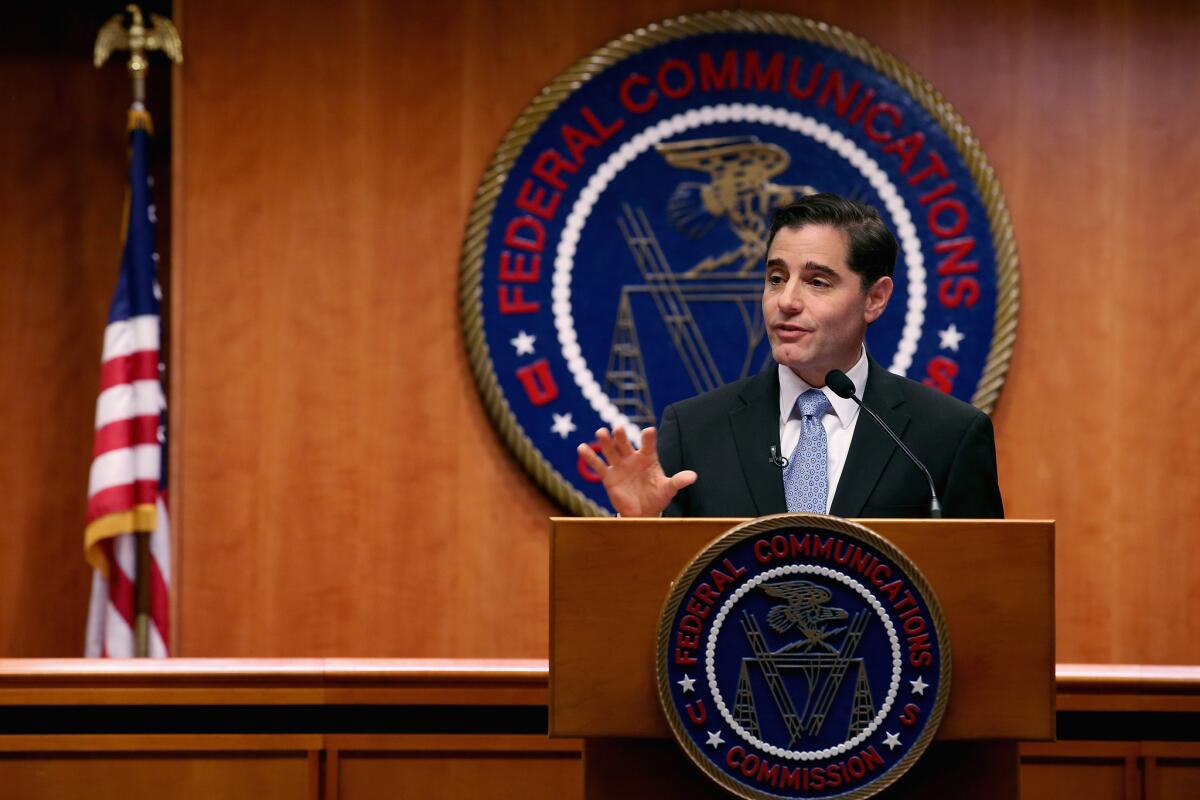‘Net neutrality’ rules defeat: It’s not as scary as it seems

The appeals court ruling Tuesday that rejected most of the Federal Communications Commission’s “net neutrality” rules sent a fair number of Internet advocates into panic attacks. But the worst-case scenarios laid out in the media — consumers gouged, rival websites blocked, commercialization triumphant — are for the most part overblown.
That’s because the ruling was actually a victory for the methodical rule-making process conducted by former FCC Chairman Julius Genachowski (shown in an unflattering photo above). In sharp contrast to his predecessor’s attempt to force broadband Internet providers to treat all legitimate traffic on their networks equally, Genachowski’s rules weren’t thrown out wholesale.
In fact, the court held that the FCC established that it did indeed have the authority to protect “edge providers” — that is, websites, services and uploaders — against mistreatment by broadband Internet service providers. What the court rejected were the specific rules the commission adopted to preserve openness online.
The court’s ruling left the commission with a clear choice for how to go forward. If it wants to bar ISPs from unreasonably discriminating against or blocking the legitimate traffic from websites they don’t favor, it can reclassify them as telecommunications services subject to that kind of regulation. Doing so, however, would trigger a huge fight with cable and phone companies, and the FCC would have to find a good rationale for reversing its decisions in the 2000s to classify broadband as an information service subject only to light regulation. That’s because the ISPs and their allies in Washington argue forcefully that turning their networks into dumb pipes would stifle new investment.
(Never mind that ISPs have steadily improved the capacity of wired and, especially, wireless broadband networks over the past decade even as they hewed to the neutrality status quo.)
The other option for the commission is to find a middle ground, developing an enforcement strategy that uses the authority the appeals panel says it has but stopping short of the rules that went too far. I’m not steeped enough in communications law and regulation to know what that might be, but I suspect it would be more along the lines of stopping blatantly anti-competitive behavior.
For example, if Verizon decided to prevent its customers from using Skype, or if Time Warner Cable took cash from Hulu in exchange for slowing the delivery of Amazon Prime videos to a crawl, you’d think the FCC would be able to find a way to do something about it. Granted, it didn’t have much success when it caught Comcast interfering with a rival video-on-demand service from Vuze. But that was before the last rule making, which established clearly its authority to regulate on behalf of “edge providers.”
Now for the caveats.
Such an approach wouldn’t stop ISPs from striking deals with major websites and services to give their traffic priority within their networks, or exempting their traffic from users’ data caps. These deals could give the participants an edge over their rivals, making it harder for start-ups and sites without deep-pocketed backers to succeed.
That’s what some Internet advocates fear. And it’s not an unreasonable worry, considering Verizon’s argument to the appeals court that ISPs have a 1st Amendment right to present their customers an edited version of the Web. In short, Verizon was arguing that ISPs should be able to present the Net as a bundle of channels they’ve chosen, a la cable TV.
That notion is not only hostile to the spirit of the Net and its users, it undermines the ISPs’ immunity from liability for the content they deliver, as The Times’ editorial board argued in September. Sadly, the court decided the case without commenting on ISPs’ speech rights.
So why shouldn’t Internet users panic? Let me offer a couple of reasons. First — and this isn’t going to reassure people — ISPs already had the freedom to gouge their customers. Rate hikes are routine for wired broadband, thanks to the thin veneer of competition in the market. And data caps are steadily becoming the norm. These issues have nothing to do with Net neutrality; in fact, if done right, data caps actually shield average users from having to pay for the traffic consumed by incessant video streamers and file sharers.
Second, the sites and services that have the biggest incentive to seek special treatment from ISPs are those that aren’t already dominant. Think Bing, not Google. And what we’ve seen from the mobile app world is both instructive and encouraging on this front. All sorts of sites and services pay to be preloaded onto new phones, even immovably so. That hasn’t stopped consumers from finding and using the apps they prefer, which includes whatever hot new app comes down the pike.
And finally, any attempt by ISPs to favor deep-pocketed partners seems likely to meet the same fate that America Online did when dial-up gave way to broadband. Consumers rejected convenience in favor of liberty, resoundingly. They don’t want to be told where to go by their ISP; they’ve already been told by their social networks.
The thing about the Internet is that it’s well-nigh impossible to stop people from going where they want to go. Remember when a federal court granted an injunction against the original Napster? People quickly bounced to other networks and services that offered even more powerful file-sharing capabilities.
The architecture of the Net is set up to circumvent barriers. So if ISPs start to become a problem instead of a solution, technology companies would find a workaround. In fact, Eric Klinker, the chief executive of BitTorrent, the powerfully disruptive company behind the world’s most popular file-sharing protocol, wants to get working on one now.
“We need a new series of protocols that — regulated or not — cannot be manipulated by carriers or other forces,” Klinker wrote in a blog post. “This is a call for a true, open Internet.”
Whatever you think about your ISP, it has to recognize the lessons of history here. That’s why The Times’ editorial board urged broadband providers Wednesday to help the FCC craft a neutrality regime that preserves the freedom and innovation that have been the Internet’s hallmark. To do otherwise, the board warned, would “risk devaluing their most valuable product.”
ALSO:
The media and Chris Christie: Going overboard in Jersey
Killed for texting in Florida: What in the wired world is going on?
Lena Dunham, keep your clothes off: Why the nudity on ‘Girls’ is a revolutionary act
Follow Jon Healey on Twitter @jcahealey and Google+
More to Read
A cure for the common opinion
Get thought-provoking perspectives with our weekly newsletter.
You may occasionally receive promotional content from the Los Angeles Times.











